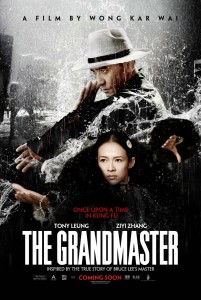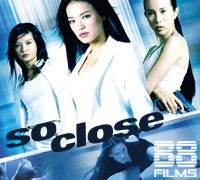AKA: The Grandmasters
Director: Wong Kar-wai
Cast: Tony Leung, Zhang Ziyi, Chang Chen, Song Hye Kyo, Zhao Benshan, Max Zhang Jin, Cung Le, Chin Shih-Chieh, Yuen Wo-Ping, Lo Meng, Fang Cheng-Cheng
Running TIme: 139 min.
Review by Ghost Dragon Triad
Wong Kar-Wai’s Ip Man biopic The Grandmaster is a fever dream of a film, a movie as much about the fleeting qualities of love and experience as it is about the life of its titular hero.
To address the elephant in the room: the film is guaranteed to disappoint anyone looking for a straight martial arts picture dressed up in the affectation of the director’s signature style. As much as style, The Grandmaster brings Wong Kar-Wai’s narrative vision to the tale of Ip Man. The film is huge and episodic, spanning decades and following numerous protagonists on myriad tangential stories – it’s film as the modern novel, an impressionistic tableau told through the haze of memory; Inglourious Basterds on heroin.
The story itself covers all the terrain of both Ip Man films starring Donnie Yen and much, much more. We enter the narrative before the Japanese invasion of China, as Ip Man lives in peace and prosperity with his wife and children. We follow him through the war, and into an illicit and sexless romance. Ip Man falls in love with rival martial artist Gong Er, played by the predictably terrific Ziyi Zhang, yet they share barely any scenes with one another. Rather, as the narrative splits and follows each of their exploits during and after the war – which takes us to Hong Kong, into the story of Ip Man 2 – the characters live in one another’s memories, and fuel one another’s passions.
Much like Wong Kar-Wai’s other recent historical epic, 2046, The Grandmaster feels like a life remembered more than a story told. The audience is given fragments of images, sequences broken out of chronological order, massive gaps in time, leaps from one character’s perspective to another. It is a movie to be taken in gradually and understood cumulatively, rather than followed logically and consumed quickly.
Don’t be surprised if, at numerous points throughout the film, you have no idea what’s going on, who certain characters are, and how they relate to the central story. Some of The Grandmaster’s many fragments are explained elliptically minutes, if not hours, later in the film; others simply vanish into the ether, like lost memories. There is at least one character – The Razor – who has nothing to do with the central narrative, and yet is given a handful of scenes to himself. Why is he there? Who knows.
This approach is guaranteed to frustrate many viewers. Even fans of Wong Kar-Wai’s oeuvre can grow weary of his often seemingly pointless meandering. Yet something very profound is at work in The Grandmaster. From a filmmaking perspective, it’s frankly astounding how much material the picture covers in its reasonable run time (123 minutes). The way in which the movie encompasses enormous passages of time through series of impressionistic shots and climactic confrontations is very impressive. And, as with 2046, The Grandmaster manages to provide enough emotional ballast and moments of profound humanity to overcome its occasional lack of cohesion and frequent lapses in concentration.
One small point of contention is the absence of a long-time Wong Kar-Wai collaborator, cinematographer Christopher Doyle. Replacement Philippe Le Sourd does a passable job of imitating Doyle’s style, but on the whole, The Grandmaster lacks the smoky, sensuous, melancholy, and hopelessly romantic look of the director’s best work. There are scenes in which objects and shadows obscuring shots feel more like mistakes than they do intentional fragmentation.
As the titular character, Tony Leung provides a graceful and melancholic performance not unlike his turns in previous films with the director; he is confident and graceful, but with enormous depths of melancholy and fragility lurking in his eyes. One thing Ip Man isn’t in this film is an action hero, or really a hero of any kind. He is yet another one of Wong Kar-Wai’s fragile people, a man in constant conflict with the decisions he makes. The Grandmaster is, ultimately, for all its flailing fists and slashing swords, a sweeping historical romance dressed up as a martial arts film. At the end of the day, it’s a simple equation: if you like Wong Kar-Wai, you will like this film. If you don’t, you won’t.
Ghost Dragon Triad’s Rating: 8/10





Pingback: Trailer of Master z The IP Man legacy – Amdb